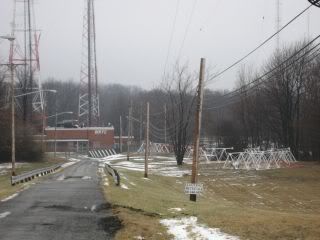We don’t have all the information yet, but we think we can take a look at the “picture” of the upcoming digital TV transition in Northeast Ohio…just two weeks before the originally scheduled mandated date for full-power TV stations to take their old analog signals dark.
And yes, that phrase “originally scheduled” is becoming quite important.
After fits and starts in Washington, it looks like the U.S. House of Representatives is about ready to approve a shift of the national digital transition date from February 17th to June 12th.
TV Week reports that due to various House rules and scheduling, that vote is now expected to come Wednesday.
The House already turned aside an earlier Senate bill delaying the transition, but only because it didn’t reach a two-thirds majority needed for passage under the rules. The current bill passed the Senate as well, but will only need a majority for passage.
With that considered likely, and the support of the Obama administration already assured, the date move is expected to be signed into law.
Oh, did we mention that over 500 stations – roughly 30 percent of all TV stations in the country – have told the FCC that they’re going to switch anyway on or near Feburary 17th?
Yep, that’s right, the new date is voluntary, and is basically etched in water for many areas, as station owners and groups line up to turn off their analog transmitters.
For the Cleveland-Akron TV market, that might be a problem – and that early analog shutoff line may not form here.
The rumblings we’re hearing from local TV sources are pretty much identical. No one expects the bulk of Cleveland market TV stations to stick with the February 17th date, assuming a move to June 12th becomes law.
The biggest problem is technical, as two large stations – NBC affiliate WKYC/3 and PBS affiliate WVIZ/25 – aren’t able to go to their post transition facilities…since their shared tower at the WKYC transmitter site is not anywhere near completion…for that matter, it’s not even going up yet.
 We took a ride up Broadview Road on Monday, and were going to take pictures to show any progress we could find…but we found no progress, so we’re rerunning this picture we took in January.
We took a ride up Broadview Road on Monday, and were going to take pictures to show any progress we could find…but we found no progress, so we’re rerunning this picture we took in January.
Add in a little more snow cover, and that’s what it looks like now, with those tower pieces still sitting on the lawn in front of the WKYC transmitter building.
WKYC senior director Frank Macek has more in a Monday “Director’s Cut” blog item:
WKYC’s Director of Technology Mike Szabo tells us and the Plain Dealer construction on our new television tower continues to be delayed thanks to problems with our tower contractors working on another tower that hasn’t been completed due to weather delays.
Thus, WKYC will continue broadcasting on digital channel 2 until the tower is complete and on analog Channel 3 until the FCC chooses it’s final shutdown date.
More on that Plain Dealer article in a bit.
Though we haven’t heard out of all stations yet, it would appear that WKYC staying on analog 3 until the tower completion will preclude other stations from pulling the analog plug on February 17th – assuming a date change is enacted by Congress and signed by President Obama.
Basically, it would seem likely that no other station wants to abandon its analog signal with one major commercial outlet still up and running.
If there’s no date change, WKYC would have to sign off analog 3 on the originally scheduled February 17th date two weeks from today, leaving the problem-plagued digital channel 2 as the station’s temporary home.
We can’t blame the folks on Lakeside if they’re not looking forward to that. For many over-air viewers, digital channel 2 as the only signal would mean the station would basically disappear without cable or satellite.
And WKYC has one other problem, alluded to by House Republicans quoted in that TV Week article…even if it magically finished the not-yet-rising tower on Broadview Road soon, it can’t move to digital channel 17 until Trinity Broadcasting Network O&O WDLI/17 Canton vacates its analog channel.
With a transition date move to June apparently possible, we have seen no indication that TBN is leaving its analog channels early anywhere. That could well change, as everything has in this Mess of a Transition – much of the mess being caused by Congress at this point.
And about that PD article on the local digital transition by business writer Shaheen Samavati: It’s not perfect, but Samavati hit the highlights pretty well.
It’s no surprise to any regular reader here that problems receiving three local channels dominate the article – the aforementioned WKYC and WVIZ, along with Raycom Media CBS affiliate WOIO/19, are mentioned frequently.
As for “Cleveland’s CBS 19”, quoting the article:
Jim Stunek, director of operations for WOIO Channel 19, said the station is operating at the maximum level allowed by the FCC, but is requesting permission to expand its coverage. He didn’t know when that would happen.
“It’s a time consuming process,” Stunek said.
Mr. Stunek is technically correct.
But the article doesn’t mention one big problem for WOIO – the powerful currently-analog signal of Canada’s CFPL/10 in London, Ontario. Even if the Canadians stick with a 2011 digital transition, we believe CFPL is also sticking with channel 10 – the same channel WOIO uses for its digital channel.
Propogation over Lake Erie makes that channel selection difficult for WOIO-DT viewers, especially in areas near the lake itself. Residents in those areas historically had little trouble picking up CFPL (it showed up on local cable systems many years ago), before the digital side of WOIO hit the airwaves…just as London residents have little problem picking up many Cleveland TV and FM stations.
These are words we’ve written before.
But we do expect the situation to improve for WOIO viewers to some degree, whenever the station’s maximization application turns to reality. And Dispatch CBS affiliate WBNS/10 in Columbus will also vacate analog 10 at the transition, so that should help WOIO viewers to the south.
Reality is pretty stable for stations like Scripps ABC affiliate WEWS/5, which is already camped out with a full-power signal on post-transition digital channel 15. But station engineer Barry Pinney tells the Plain Dealer that even he’s getting some viewer calls about reception:
“It’s almost always an individual deal, and we try to walk people through that,” he said. Most commonly, it’s those who were getting by watching a poor, static-filled analog version before making the switch to digital.
That’s probably one of the biggest truths about the digital TV transition…if you’re eeking along watching through a lot of analog snow, you may not be able to get a station’s digital signal at all.
This is not 100% accurate, as the station’s digital facility may end up reaching you for whatever reason. But marginal signals in digital don’t translate to snow…they translate into dropped or non-decodable signals, and blank or unwatchable screens.
Both WEWS and Local TV Fox affiliate WJW/8 do have a little work to do after the transition.
But for Channel 5, that work will basically be invisible to viewers – with power maximization and a move of the current digital antenna to the top of the tower, the station will mount an auxiliary antenna at the current digital power level to ensure continued service in the work period. It’ll turn into a backup after the work is complete.
Channel 8 will move its digital signal from channel 31 to its former analog channel 8 – whenever that switch is made, either by federal deadline or by an early move by the station. The post-transition digital 8 will be a fully-maximized facility (30KW, the highest power for VHF), and looks to be robust from here.
As we said, we haven’t heard from everyone yet…but the prevailing thought so far is that February 17th in Cleveland TV will only see a digital transition if the federal date doesn’t move to June.
Youngstown, though, is a different story.
New Vision CBS affiliate WKBN/27 and LMA partner Parkin Broadcasting ABC affiliate WYTV/33 have already filed to shut down their analog signals on February 17th – two of the over 500 stations we noted earlier. (If you’d like a complete list, visit Trip Ericson’s RabbitEars.info, or Doug Smith’s W9WI.com…Doug’s list includes stations which have already dumped analog, including WNEO/45 and WMFD/68 in our region.)
In addition to WKBN and WYTV, a few other stations in Ohio are listed as readying for a February 17th analog shutoff date at this writing, including the NBC and Fox affiliates in Columbus, Dayton’s CBS, ABC and Fox outlets, Lima’s NBC affiliate WLIO/35, Toledo PBS affiliate WGTE/30 and Steubenville NBC affiliate WTOV/9.
Two stations in West Virginia which serve Ohio viewers are also there – including WTOV competitor WTRF/7 in Wheeling, and Parkersburg’s NBC affiliate, WTAP/15.
No stations are listed in the Cleveland or Cincinnati market, at least yet.
A common thread? It appears some station groups – like Sinclair – are filing for these as a group, though we don’t know why Sinclair’s WSTR/64 in Cincinnati isn’t up yet. The lists are sure to grow by the day, however.
In our recent travels, the message has been coming quite clear from those who work in television engineering – Congress can make whatever laws it wants to make, but it can’t stop analog transmitters from falling into disrepair and shutting off.
(Remember, engineers have paid very little attention to those units, as they were expected to be taken out of service for good in two weeks.)
Stations also have very little appetite, even with transmitters still working, to pay tens of thousands of dollars to keep those little-viewed power-sucking boxes going for another four months. That money is just not in the station budgets, and most TV stations are sending employees packing even WITH the previous assumption that analog TV would go away in February, along with those second power bills.
It’s this cost that is likely prompting most of the movement by cost-conscious groups like Sinclair.
Again, a mess caused by Congress, in our humble opinion.
Whatever problems will show up after the digital transition will show up in February, or June, or whatever date it finally happens…and post-transition work to improve things (even previously scheduled work like maximizing digital signals) needs to happen anyway.
No “magic wand” of moving the long-publicized date to June 12th will ensure a problem-free transition after that date…in Northeast Ohio or anywhere else in the country…



Speak Your Mind